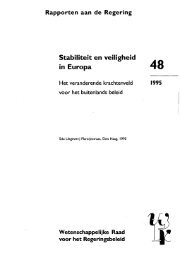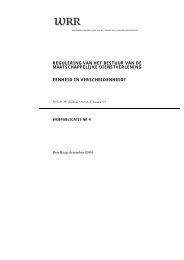De overheid als keuzearchitect? - Wetenschappelijke Raad voor het ...
De overheid als keuzearchitect? - Wetenschappelijke Raad voor het ...
De overheid als keuzearchitect? - Wetenschappelijke Raad voor het ...
Create successful ePaper yourself
Turn your PDF publications into a flip-book with our unique Google optimized e-Paper software.
de ov er heid a l s k eu z e a rchi t ec t<br />
20<br />
People would use the low interest rates to get out a new mortgage on<br />
the increased value of their home, in order to build a big addition or<br />
put in a big television set. There was a lot with keeping up with the<br />
Joneses. My neighbor put an addition to his house and put in a big tv,<br />
so I need to put an addition on my house and put in a bigger tv. Now<br />
again the same problem occurred with ceo’s. There was earnings<br />
envy. On the golf course you had one ceo bragging about how much<br />
money he was making selling credit default swaps, and others were<br />
saying: you are not doing that? You know I’m making hundreds of<br />
millions, why are you not doing that? So we are keeping up with the<br />
Joneses from the bottom to the top, so what can we do about this? I<br />
don’t think the answer is heavy-handed government regulation. And<br />
the reason is that the regulators would not be capable of regulating.<br />
Bob Ruben, a former treasury secretary who was serving as the vice<br />
chairman of Citigroup has admitted never having heard of the term<br />
liquidity put, until he discovered that Citicorp had lost 50 billion<br />
dollars selling liquidity puts. Now they don’t come any smarter than<br />
Bob Ruben. I gave a talk in Washington last February to the treasury<br />
department and I asked: who here is ready to take over running<br />
Citibank? No one raised their hand. I gave the same talk in London a<br />
couple weeks later and asked the same question about the Royal Bank<br />
of Scotland and got the same answer. So we don’t want bureaucrats<br />
trying to run banks that were too complicated for the ceo’s to run. I<br />
think the answer has to be in better disclosure, again electronic. Here<br />
is the needle we have to try to thread. We need to get the organizations<br />
to disclose enough so that the regulators can monitor what<br />
they are doing and the market can <strong>als</strong>o monitor what they are doing.<br />
If I am an investor in aig, I want to know what their exposure is to<br />
credit default obligations. so that I don’t invest in that company. But<br />
we can’t ask them to disclose so much that they can no longer make<br />
a living. That is the goal. I know the devil is in the detail, as it always<br />
is, but I think that’s the goal we should be shooting for. One principle<br />
I’ve been urging is: too big to fail means too big to hide. So the bigger<br />
you are, the more you have to tell us. With some little bank in some<br />
country town, I don’t care what they are doing. If it is Citibank and we<br />
have to bail them out if they go under, then they have to tell us at least<br />
what their leverage is and what exposure they have to systematic risk.

















